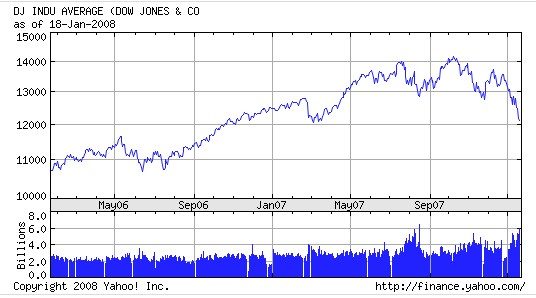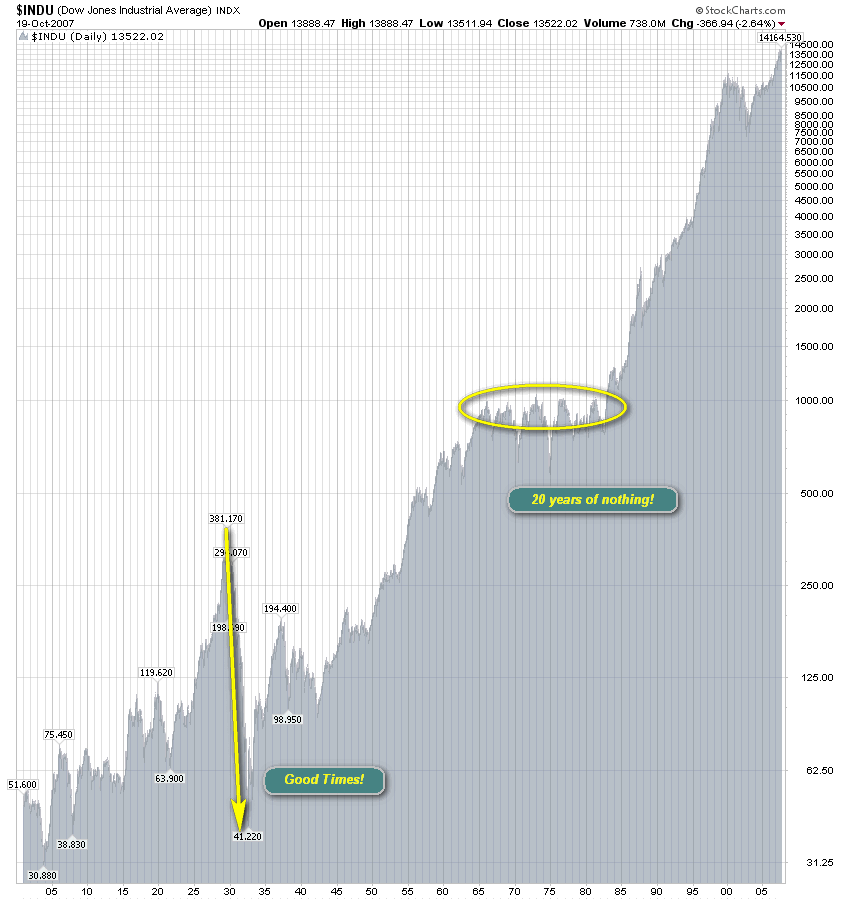Tomorrow is shaping up to be a very ugly day for the stock market. Dow futures -546. That's horrific. The Nikkei is crashing as I write this. Prepare for panic selling.
Miserable Monday: Biggest FTSE crash since 9/11 wipes off more than £75bn in shares
Last updated at 01:07am on 22.01.08
Turmoil: Traders at the London Stock Exchange have seen the FTSE drop sharply since the beginning of January
The stock market went into meltdown yesterday with the biggest fall in share prices since 9/11.
More than £75billion was wiped off the value of Britain's 100 biggest companies amid fears of a recession in the U.S.
It is the worst start to the year for the stock market since records began in 1936 and left the Bank of England facing acute pressure to slash interest rates.
In a disastrous day for investors, every single stock market in Europe and Asia plummeted, with falls of up to 8.5 per cent.
The FTSE 100 plunged an extraordinary 323.5 points to close at 5,578, a fall of 5.5 per cent.
Since January 2 it has lost nearly 1,000 points, or 13.6 per cent, hammering savings, pensions and other investments.
All eyes will be on Wall Street today when the Dow Jones index re-opens. It was closed yesterday for a holiday, but the futures market remained open and offered a grim portent, falling 546 points or 4.5 percent.
Should the Dow follow a similar pattern it would rank as the fourth-largest point loss ever for the New York exchange. Last night experts were forecasting a 400-point drop.
David Buik, a partner at the brokers BGC Partners, said: "The smell of fear hangs over the City. I've never seen it this bad."
The timing could hardly have been worse for Chancellor Alistair Darling, who was yesterday detailing plans to save Northern Rock by turning its £25billion Bank of England loan into bonds and selling them to investors.
The market meltdown was triggered by growing fears about the health of the global economy and particular concerns about America and China.
Analysts fear President Bush's £75billion of tax cuts unveiled on Friday, designed to help consumers rescue the economy by spending, will not be enough to prevent the world's biggest economy from slipping into recession. There were also fears that
the sub-prime loan crisis could have spread as far as China. Rumours circulated yesterday that the Bank of China could be about to write-down losses of more than £1billion linked to the subprime debacle in the U.S.
Martin Slaney, of traders GFT Global Markets, said: "A gloomy concoction of poor economic and corporate news plus a growing acceptance that the sub-prime fallout has much further to go has created the highly distressed conditions for a global sell-off in equities."
There was further gloom with a triple whammy of poor public sector finance figures, a collapse in mortgage lending and another investment giant imposing a long delay releasing investors' money.
Conservative Treasury spokesman Philip Hammond said: "Psychologists say this is Blue Monday, the most depressing day of the year. It certainly is for Alistair Darling.
"But it will be hard-pressed families who will have to pick up the pieces through yet more stealth taxes."
The fall is seen as indicative of the difficulties facing thousands of aspiring homebuyers struggling to find a mortgage they can afford. Research from the website Money-Expert.com shows more than 460,000 people have missed at least one mortgage repayment over the last six months.
Another savings giant yesterday shut the door to investors seeking to take out money.
Around 200,000 clients of Scottish Widows's £2billion property funds will be forced to wait six months to withdraw their cash.
It is the second firm in a week to hit the panic button over the high number of investors rushing to bale out.








